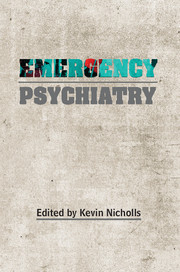Book contents
- Frontmatter
- Contents
- List of contributors
- Acknowledgements
- Preface
- 1 Assessment of suicide risk
- 2 Violence and aggression
- 3 Substance misuse emergencies
- 4 Alcohol and psychiatric emergencies
- 5 Acute psychosis
- 6 Acute side-effects of psychotropic medication
- 7 Emergencies in child and adolescent psychiatry
- 8 The psychiatric intensive care unit
- 9 Safeguarding
- 10 Emergency electroconvulsive therapy
- 11 Life-threatening medical emergencies in a mental health unit
- 12 Emergencies in intellectual disability psychiatry
- 13 Emergencies in older persons’ psychiatry
- 14 Perinatal psychiatric emergencies
- 15 Civilian and military psychological trauma
- 16 Emergencies in liaison psychiatry
- 17 Psychiatric emergencies in deaf people
- 18 Mental health law
- 19 Self-poisoning: aspects of assessment and initial care
- Index
- Frontmatter
- Contents
- List of contributors
- Acknowledgements
- Preface
- 1 Assessment of suicide risk
- 2 Violence and aggression
- 3 Substance misuse emergencies
- 4 Alcohol and psychiatric emergencies
- 5 Acute psychosis
- 6 Acute side-effects of psychotropic medication
- 7 Emergencies in child and adolescent psychiatry
- 8 The psychiatric intensive care unit
- 9 Safeguarding
- 10 Emergency electroconvulsive therapy
- 11 Life-threatening medical emergencies in a mental health unit
- 12 Emergencies in intellectual disability psychiatry
- 13 Emergencies in older persons’ psychiatry
- 14 Perinatal psychiatric emergencies
- 15 Civilian and military psychological trauma
- 16 Emergencies in liaison psychiatry
- 17 Psychiatric emergencies in deaf people
- 18 Mental health law
- 19 Self-poisoning: aspects of assessment and initial care
- Index
Summary
This book originated in 2011 when I was asked to raise, coordinate and edit a book on emergencies in psychiatry by the Publications Director at the Royal College of Psychiatrists. Writing this at the end of 2014, I'm unsure whether I should not have sought expert authorship of a chapter advising on suitable treatment for editors of psychiatry books!
Recruiting authoritative contributors in the current climate of relentless and insidiously cumulative financial squeeze was difficult. On the basis of occasional comment by eminent peer reviewers, I wonder whether some much-esteemed and yet only recently retired academic colleagues fully realise the extent to which the research and teaching fabric has now become eroded by sustained cuts in NHS support of these endeavours. Resource levels as recently as the 1990s, when I was a trainee, seem positively halcyon compared with contemporary stringencies.
In this context, I especially applaud the contributors who filled the breach to produce this book. They range from exceptional trainees and non-consultant grade colleagues to senior consultants and professors. I am immensely proud of the team that stepped forward.
I was also particularly fortunate in being able to persuade the only nonclinician in the team, Dawn Crowther, to write on legal considerations relating to the Mental Health Act 1983 (as amended in 2007) and the Mental Capacity Act 2005. At the risk of embarrassing Dawn, I can report without fear of contradiction that she is a foremost authority in this field.
Unable to find an expert contributor able to commit to writing a chapter on electroconvulsive therapy (ECT), I wrote that chapter myself and take full responsibility for any failings. Given the broad readership that this book targets, detailed technical considerations and legal commentary regarding ECT is precluded. All matters relating to these and otherwise are most properly deferred to The ECT Handbook, also published by the College, the authoritative text on this subject.
I have also provided the final chapter, which is an overview of the treatment of self-poisoning, against advice from some quarters. I must emphasise that I am in no way implying that psychiatrists should be medically managing overdose patients. However, background knowledge of medical treatment of overdose is important as a ‘level 1’ awareness insight and is perhaps comparable in importance to, for example, anaphylaxis treatment training.
Information
- Type
- Chapter
- Information
- Emergency Psychiatry , pp. viii - ixPublisher: Royal College of PsychiatristsPrint publication year: 2015
